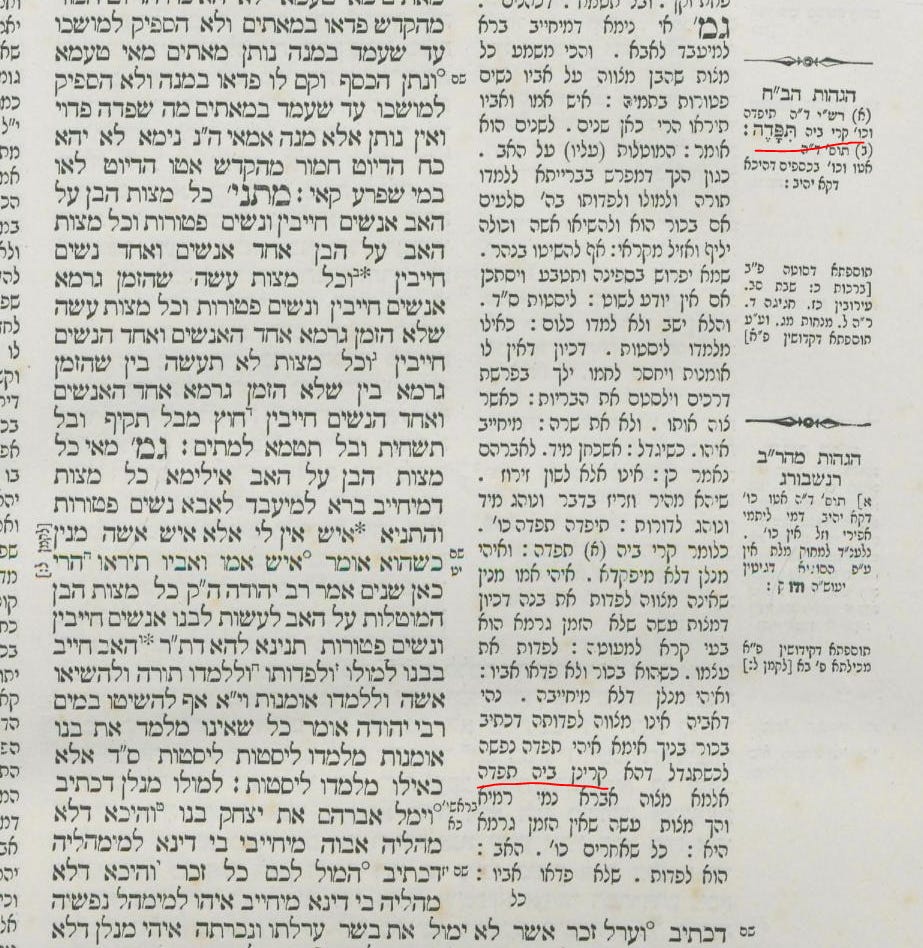Revocalization With Missing Vowels
In Kiddushin 29a, a brayta gets a lot out of a single word תפדה, by reading in new vowels:
לִפְדּוֹתוֹ. מְנָלַן? דִּכְתִיב: ״כׇּל בְּכוֹר בָּנֶיךָ תִּפְדֶּה״. וְהֵיכָא דְּלָא פַּרְקֵיהּ אֲבוּהּ מִיחַיַּיב אִיהוּ לְמִפְרְקֵיהּ דִּכְתִיב: ״תִּפְדֶּה תִּפָּדֶה״.
§ The baraita teaches that a father is obligated to redeem his son. The Gemara asks: From where do we derive this? The Gemara answers that this is as it is written: “All the firstborn of your sons you shall redeem” (Exodus 34:20). And in a case where one’s father does not redeem him he is obligated to redeem himself, as it is written: “You shall redeem [pado tifde]” (Numbers 18:15). The repetition of the verb indicates that a firstborn is required to be redeemed in any case, even if his father neglects to do so.
וְאִיהִי מְנָלַן דְּלָא מִיפַּקְדָה? דִּכְתִיב: ״תִּיפָּדֶה״ ״תִּפְדֶּה״, כֹּל שֶׁמְּצֻוֶּוה לִפְדּוֹת אֶת עַצְמוֹ – מְצֻוֶּוה לִפְדּוֹת אֶת אֲחֵרִים, וְכֹל שֶׁאֵינוֹ מְצֻוֶּוה לִפְדּוֹת אֶת עַצְמוֹ – אֵינוֹ מְצֻוֶּוה לִפְדּוֹת אֲחֵרִים.
And from where do we derive that a mother is not commanded to redeem her son? As it is written: “You shall redeem [tifde]” which can be read as: You shall be redeemed [tippadeh]. This indicates that whoever is commanded to redeem himself is commanded to redeem others, and whoever is not commanded to redeem himself is not commanded to redeem others. Since a woman is not commanded to redeem herself, she is not commanded to redeem her son either.
One is the active, “you shall redeem”, while the other is the nif’al, the passive, “you shall be redeemed.” In out gemara text, they add the yud to the first version, even though in Biblical Hebrew that yud should not be there. It is a chirik chaser, not a chirik malei. They are actually pronounced differently.
There’s a Rashi on the continuation that talks about how it is read, but alas doesn’t have nekudot in our Vilna Shas.
ואיהי מנלן דלא מיחייבה - נהי דאביה אינו מצווה לפדותה דכתיב בכור בניך אימא איהי תפדה נפשה לכשתגדל דהא קרינן ביה תפדה אלמא מצוה אברא נמי רמיא והך מצות עשה שאין הזמן גרמא היא:
Luckily, the Bach comes to tell us the vowel points:
Among printings, Vilna is unique here, in putting a yud in the first word, for the active:
Venice and Costa just have תפדה twice, and Guadalajara actually puts the yud in the second, passive word.
Among manuscripts, it is again just תפדה twice.
While discussing this daf, I may as well propose an alternate derasha mechanic. On Kiddushin 29b:
תָּנוּ רַבָּנַן: לִפְדּוֹת אֶת בְּנוֹ וְלַעֲלוֹת לָרֶגֶל – פּוֹדֶה אֶת בְּנוֹ וְאַחַר כָּךְ עוֹלֶה לָרֶגֶל. רַבִּי יְהוּדָה אוֹמֵר: עוֹלֶה לָרֶגֶל, וְאַחַר כָּךְ פּוֹדֶה אֶת בְּנוֹ. שֶׁזּוֹ מִצְוָה עוֹבֶרֶת, וְזוֹ מִצְוָה שֶׁאֵינָהּ עוֹבֶרֶת.
The Sages taught: If one has money to redeem his son and to ascend to Jerusalem on the pilgrimage Festival, he redeems his son and then ascends to Jerusalem on the pilgrimage Festival. Rabbi Yehuda says: He ascends to Jerusalem on the pilgrimage Festival and then redeems his son. His reasoning is that this trip to Jerusalem for the pilgrimage Festival is a mitzva whose time soon passes, and this, the redemption of the firstborn son, is a mitzva whose time does not soon pass, as it can be fulfilled later.
בִּשְׁלָמָא לְרַבִּי יְהוּדָה, כִּדְקָאָמַר טַעְמָא. אֶלָּא רַבָּנַן מַאי טַעְמַיְיהוּ? דְּאָמַר קְרָא: ״כׇּל בְּכוֹר בָּנֶיךָ תִּפְדֶּה״, וַהֲדַר: ״לֹא יֵרָאוּ פָנַי רֵיקָם״.
The Gemara asks: Granted, according to the opinion of Rabbi Yehuda, it is as he stated in his reasoning, i.e., Rabbi Yehuda provided the rationale for his opinion. But what is the reasoning of the Rabbis, who say that he should first redeem his son? The Gemara answers that the reason is that the verse states: “All the firstborn of your sons you shall redeem” (Exodus 34:20), and it then states, in the same verse: “And none shall appear before me empty,” referring to the pilgrimage Festival in Jerusalem. The order of the verse indicates that one should redeem his firstborn son before traveling to Jerusalem on the pilgrimage Festival.
The plain reading of this is that it is the juxtaposition between the two, and so the first one goes first.
But we could say more than that here. Someone only has a finite amount of cash, such that he can either redeem his son or ascend to the Festival. Then, first we have “you shall redeem”. Then, he gets to fulfill the second part of the verse — when you are empty, reikam, you shall not appear before me. לֹא יֵרָאוּ פָנַי רֵיקָם.






